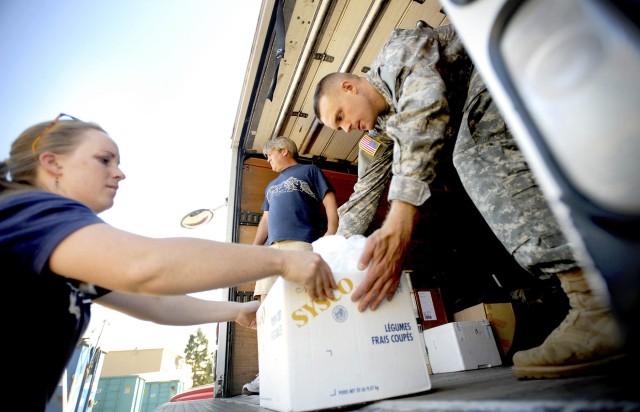
JOINT BASE LEWIS-MCCHORD, Wash. -- Nine years ago when Terry Austin sat down with more than a dozen individuals to map out the Fort Lewis sustainability program, she thought the plan's "zero net waste by 2025" goal was unrealistic.
In fact, many at that first sustainability workshop wondered how the largest Army post on the West Coast would eliminate waste production in a little over 20 years. After some discussion, the installation and garrison commanders urged the team to stick to their original targets.
"They said, 'we like those big, aggressive goals,'" said Austin, who is now the Joint Base Lewis-McChord installation sustainability coordinator.
The group created six smaller sustainability teams to help them achieve the ambitious objectives. The overall goal was to help the installation reduce its environmental impacts and increase operating efficiency, while still supporting its mission to train and deploy combat-ready troops.
So what's the status of the sustainability work being done on JBLM today'
"We are in excess of (80) percent net zero waste right now," Austin said. "Something that we didn't think we'd get anywhere close to."
This year, the Lewis-McChord sustainability team has received two prestigious national awards for their accomplishments in 2010.
In January, the Army presented JBLM with a Secretary of the Army Environmental Award in the sustainability - non-industrial installation category. This award recognized nine of the base's major sustainability accomplishments including those in waste diversion and energy conservation.
JBLM will compete with other installations throughout the Department of Defense for the Secretary of Defense Environmental Awards, which will be announced later this year.
Also this year, JBLM received the Environmental Protection Agency Region 10 Champions of Environmental Leadership and Green Government Award for waste management.
Winning the EPA award surprised Ken Smith, the Environmental Division operations branch chief, who didn't know that his team had competed for it. But Smith was certain the award was based upon zero-net-waste initiative programs like recycling, illegal dumping crackdown, compost use, and concrete and asphalt diversion.
Smith said that all concrete and asphalt waste used to be dumped in a landfill on JBLM.
"We looked to the outside world and saw that a lot of concrete and asphalt was being recycled in projects," Smith said, "so we said 'why can't we do that here''"
Smith and his team conducted research on different concrete and asphalt grinds and started a pilot test for the new gravelly product.
"We had to convince workers and managers in Public Works (who) repair roads that this product was just as good as what (they're) buying outside," he said.
The product became so popular that contractors used more of the recycled product than was available. To meet the demand, Smith's team went to the landfill and dug up an entire construction and demolition cell.
"You can't just create a product and say 'here it is,' you've got to convince people that it's a good product and get them to actually use it," he said. "We've gotten to the point that a lot of the operators out there actually prefer some of the products we're making right now."
Austin said the recent awards are a culmination of a lot of the sustainability teams' successes.
"Sustainability is kind of (the) guiding star about where you want to go in 25 years," she said. "But the short-term wins are made on the ground from people's day-to-day jobs."
The Army is working on a net zero by 2020 program with aggressive environmental goals for bases throughout the world.
"The primary goal is a focus toward net zero and when we talk about net zero. It's not only net zero energy, but it's net zero energy, water, and waste," said Katherine Hammack, assistant secretary of the Army, Installations, Energy and Environment, during a DoD bloggers' roundtable discussion last October. "When you look at the term 'net zero' or a hierarchy of net zero you must start with reduction, then progress through repurposing, recycling, energy recovery, disposal being the last."
No stranger to "aggressive goals," Austin believes JBLM is already on track to meet the Army's net zero demands.
"We want to preserve what we have, not only for ourselves, but for our kids and grandkids," Austin said. "We have the ability to do that if we just engage."

Social Sharing